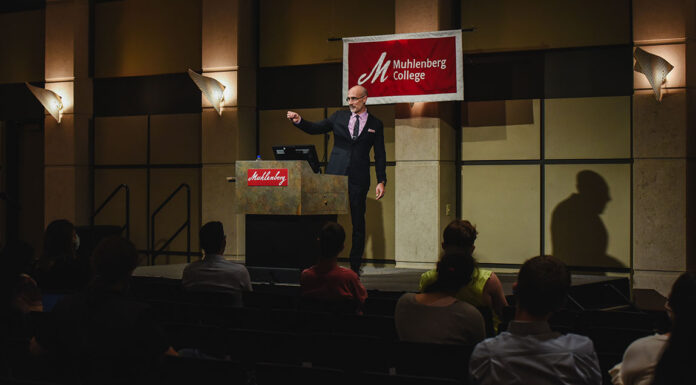
Arthur Brooks, a professor at Harvard Business School, gave a lecture at Muhlenberg on Thursday, Oct. 14. Despite having a doctorate in political policy, he has recently taken an interest in neuroscience, specifically studying human happiness. That interest inspired his lecture, “Finding Happiness in Times of COVID.” While Brooks briefly touched on happiness, the focus of his talk was about ending the polarization and division in the United States.
According to Brooks, this trend first started worrying him in 2014 when he was invited to speak at the New Hampshire Freedom Summit, a conservative conference. Two of the speakers were Donald Trump and Ted Cruz, candidates in the 2016 presidential election. After purportedly hearing the same message of “the left is bad and wants to hurt America” from all the candidates, he decided to counter that narrative. When he got on stage he started speaking about how, at the core, people on both sides want the best for the country. After this statement, a woman in the crowd yelled out: “But the Democrats are evil!” It was at that moment that Brooks realized change was needed.
Early on in his lecture, Brooks said, “You can’t solve a problem by thinking harder to solve it in a new way.” After years of trying to find a new way of approaching the issue of polarization, it was in New Hampshire that he found it. When the woman called Democrats evil, she was calling Brooks’ parents evil. He was offended on their behalf despite being politically conservative himself. “You can’t insult someone into agreeing with you,” Brooks said. Instead, Brooks argued that we can be “happy warriors for love” and understand through empathy where people are coming from.
“You can’t solve a problem by thinking harder to solve it in a new way”
Brooks identifies the root problem of polarization as a failure to effectively communicate. This failure then creates feelings of contempt. “Anger is not the issue. Anger shows that you care. The problem is contempt. Contempt says to the other person, ‘You are worthless,’” Brooks said. The way to stop feelings of contempt? Brooks suggests to “Stop, think and summon up a different emotion.”
Brooks ended his lecture on a practical note, giving five “homework” assignments to decrease polarization. First, “Don’t agree if you don’t. Stand up for your convictions.” Second, “Shut down the outrage industrial complex.” In other words, don’t consume media or listen to politicians who increase hate. “When you hate, somebody profits and it’s not you.” Third, “Look for contempt and run towards it with love. Be the example.” Fourth, whenever the desire to say something hateful comes up, say five positive things first and then say the hateful comment. “Most times you won’t even get to that last comment,” said Brooks. The last piece of advice he gave was to, “Express more gratitude and be more realistic in your expectations of others.” Brooks ended his lecture with a call to be an ambassador for unity and love in a culture of division and hate. “You all have a mission,” Brooks said. He advises that when you leave your dorm room in the morning to remember that “you are now entering mission territory.”
“I enjoyed the core message but not necessarily the presentations. The concept of meeting disagreement with kindness and understanding instead of hatred and contempt is not a novel idea. I’ve been doing it for years and I didn’t learn it from Brooks.”
While Brooks attempted to present a positive message, not everyone was happy with the way he presented his ideas. One student, who chose to remain anonymous, found the idea of loving those who hate you particularly difficult. “As a bisexual man, that statement got on my nerves as I cannot find love for those who do not want me to love who I love.”
Florian Hurlbert ‘25 was also unimpressed with the lecture. “I enjoyed the core message but not necessarily the presentations. The concept of meeting disagreement with kindness and understanding instead of hatred and contempt is not a novel idea. I’ve been doing it for years and I didn’t learn it from Brooks.”
Matthew '24 is a philosophy and political thought major on the pre-law track.





















